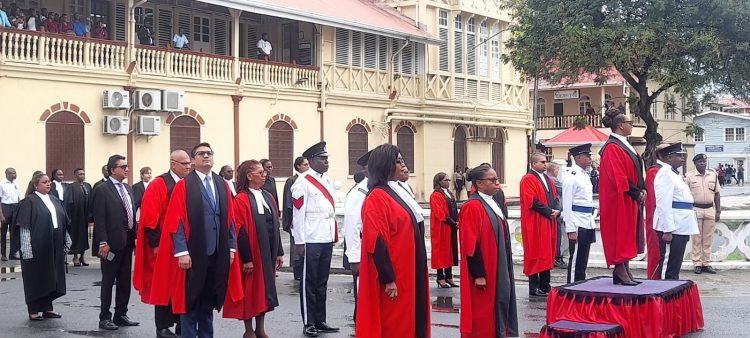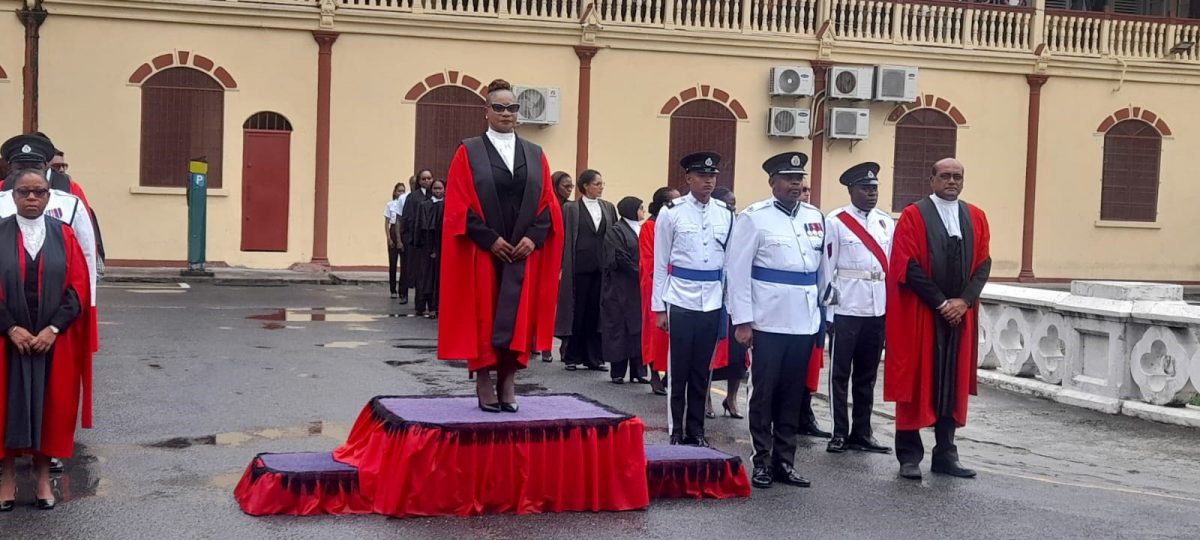The year 2024 will be an impactful year for the administration of justice in Guyana, with legislative interventions expected to take place during the year.
These remarks formed part of the address by the Attorney General (AG), and Minister of Legal Affairs, Anil Nandlall, at the opening of the Law Year 2024, held at the Supreme Court of Judicature in Georgetown on Tuesday,
Speaking on the Law Revision exercise intended to update the laws of Guyana from 2012 to December 31st 2022, Nandlall said, “Because of the volume of work, the contractor has asked for an extension and that extension has been granted and hopefully long before the conclusion of the first quarter of 2024 we will be launching both soft copies and hard copies of the Laws of Guyana.”

The AG recalled the “tongue lashing” he received for the non-appointment of the Judicial Service Commission. He noted that the commission, which was finally appointed last year, now has the important task of filling the vacancies for magistrates and judicial officers. He reminded those in attendance that applications are open for suitably qualified persons to apply, however no advertisements for the Court of Appeal vacancies have been sent out, but he hopes however that will be done soon.
Nandlall noted that Berbice has been without a Land Court judge for eight years and hopes that supplying a sufficient number would take care of the burden accrued over the years.
He also asked the judiciary to consider the appointment of a sufficient number of Court of Appeal judges that will allow for simultaneous sittings of the court and constituting more forums and for the sitting of the Court of Appeal judges in both Berbice and Essequibo, Nandlall emphasised that it can be done once sufficient numbers of judges are appointed which can be done at periodic intervals.
Digitization of the courts
Chief Justice (Ag) Roxane George, who also spoke at yesterday’s ceremony, said that the opening of the Law Year also marks the implementation of the first strategic plan of the Supreme Court of Judicature. “We of team Supreme are committed to the implementation of projects and programmes in keeping with the theme of the plan – pursuing service excellence through investment in human resources, management systems and technology.”

George posited that this will complement skillsets in management and technology in order to improve the service delivery, along with the renovation of existing courts and construction of new technology-ready court houses, some with living quarters, across Guyana.
She remarked that the Magistrate’s Court case management system which was launched in December 2023, opened the door to a new technologically advanced era that the judicial system is heading towards. This means that police can file cases electronically from police stations to the various magisterial district court offices which can then be assigned electronically to the magistrates.
Within the next few weeks, a soft launch of the litigation system for both the High Court and Court of Appeal can be expected with phase one being the Court of Appeal and phase two being the High Court, which should be ready for a launch by the last quarter of 2024.
The Chief Justice was optimistic that the litigation system would be a game changer for the administration of justice.
“We will commence with filing at service bureaus at the court registries where filing fees will be paid and the documents uploaded to the system with the assistance of registry staff.”
She added that the exchange of documents with legal counsel and court orders will be done through the court registries, and as they become familiar with the system they will migrate to having counsel file and make payments via a reducing balance credit system from the comfort of their chambers or anywhere in the world.
Self-represented litigants can file through service bureaus, and the cases will be assigned electronically to the judges. To accommodate the new systems, a committee is revising the civil procedure rules and will report to the rules committee before the end of the year.
The Chief Justice opined that the future entails moving away from having minutes books of court judicial officers as the court records, to having court-produced audios and written transcripts of all cases as the official record of cases. They will also notify other justice sector partners such as the Deeds Registry, the Land Registry, and the Child Care and Protection Agency and probation department of the Ministry of Human Services in relation to utilising the system.
In the recognition of the need to better manage criminal cases in the High Court and Magistrate’s Courts, the Chancellor of the Judiciary (Ag) Yonette Cummings- Edwards, has commissioned criminal procedure rules for review by the Rules Committee. These rules are expected to provide for a more robust case management with greater efficiency of the adjudication of criminal cases.
In order to ensure efficiency they will continue judicial education and staff training through the Justice Education Institute, since the strategic plan emphasises well-trained and competent human resources for court excellence, with plans to expand with more problem-solving courts such as the drug treatment courts and mental health courts.
The President of the Bar Association of Guyana, Ronald Burch-Smith, during his remarks said that the bar is an integral part in the implementation of the strategy.
Speaking on the Judicial Service Commission he said “It’s been six years we have been without a Judicial Service Commission, but one has been in effect for about eight months, and the vacancies being left without being filled is equally unacceptable.”
He also referred to judicial time limits as “absurd” since the amount of judges at this time is outweighed by the number of cases.






